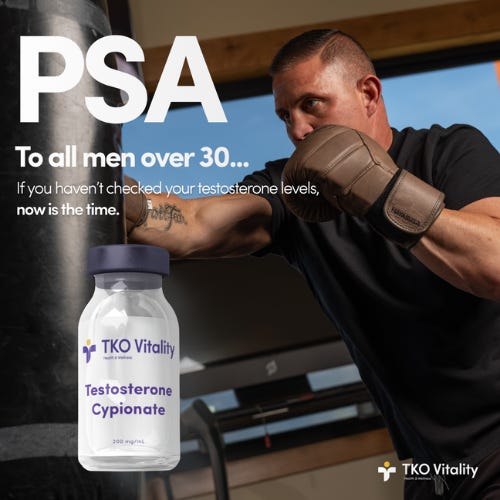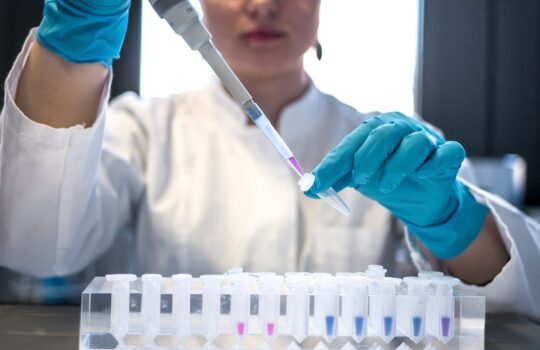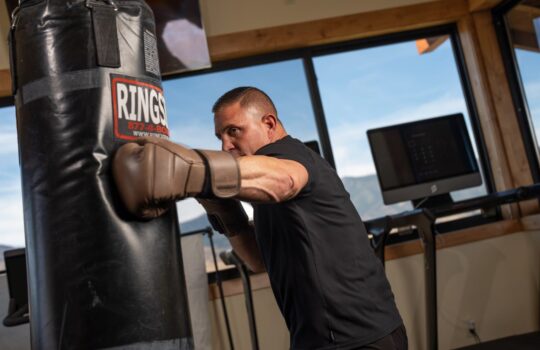Testosterone & Libido: What’s the Connection?

Low libido, fatigue, or a dip in confidence can sap your vitality, but optimizing testosterone offers a proven way to reignite your drive and zest for life. At TKO Vitality, we empower men with science-backed solutions, blending nutrition, exercise, and advanced therapies to enhance performance and well-being. Testosterone plays a pivotal role in libido, mood, and energy, and understanding its connection to sexual health can unlock a stronger, more vibrant you.
This year, take control of your hormones with TKO Vitality’s personalized coaching programs, tailored to your unique needs. Book a consultation today at TKOVitality.co/schedule.
Why Testosterone Matters for Libido
Testosterone, the primary male hormone, drives sexual desire, energy, and overall vitality. It fuels libido by influencing brain pathways, blood flow, and sexual function. Low testosterone, affecting over 40% of men over 40 per a 2024 study in The Journal of Clinical Endocrinology & Metabolism, often leads to reduced sex drive, erectile dysfunction, and mood changes. Optimizing testosterone naturally or through therapies like testosterone replacement therapy (TRT) can restore libido and improve quality of life.
At TKO Vitality, we combine hormone optimization with lifestyle strategies to address low libido holistically, ensuring sustainable results.
Understanding the Testosterone-Libido Connection
Testosterone’s impact on libido is complex, involving physical, psychological, and hormonal factors. Here’s a step-by-step guide to how testosterone drives sexual health, backed by TKO Vitality’s expertise.
Step 1: Testosterone Fuels Sexual Desire
Function: Testosterone stimulates dopamine pathways in the brain, which regulate desire and arousal. A 2024 study in Journal of Sexual Medicine found that men with testosterone levels below 300 ng/dL reported 50% lower libido than those with optimal levels (400–600 ng/dL).
Mechanism: Testosterone binds to androgen receptors in the brain, enhancing sexual motivation. Low levels disrupt this process, reducing interest in sex, per a 2023 review in Andrology.
Action: Test testosterone levels to identify deficiencies. TKO Vitality’s lab testing pinpoints hormonal imbalances affecting libido.
Step 2: Testosterone Supports Erectile Function
Function: Testosterone promotes blood flow and nitric oxide production, critical for erections. A 2024 study in Urology showed that men with low testosterone had a 30% higher risk of erectile dysfunction.
Mechanism: Testosterone maintains penile tissue health and supports vascular function, per a 2023 Endocrinology study. Low levels impair these processes, affecting performance.
Action: Combine testosterone optimization with cardiovascular health strategies like exercise. TKO Vitality’s coaching includes tailored plans to enhance blood flow and sexual function.
Step 3: Testosterone Boosts Mood and Confidence
Function: Testosterone regulates mood and self-esteem, which are crucial for libido. A 2024 Psychoneuroendocrinology study found that men with low testosterone were 25% more likely to experience depression, which dampens sexual desire.
Mechanism: Testosterone influences serotonin and cortisol levels, stabilizing mood, per a 2023 Frontiers in Endocrinology article. Low levels lead to irritability or low confidence, reducing sexual interest.
Action: Address stress and mental health alongside testosterone optimization. TKO Vitality’s programs include stress management techniques to support libido.
Step 4: Testosterone Interacts with Other Hormones
Function: Testosterone works with hormones like estrogen and cortisol to regulate libido. A 2024 Andrology study noted that imbalances, such as high cortisol from chronic stress, suppress testosterone’s effects on sexual health.
Mechanism: Elevated cortisol inhibits testosterone production, while proper estrogen balance in men supports libido, per a 2023 The Lancet study. Hormonal harmony is key.
Action: Monitor hormone panels to ensure balance. TKO Vitality’s comprehensive labs assess testosterone, cortisol, and estrogen levels.
Step 5: Lifestyle Amplifies Testosterone’s Libido Benefits
Function: Diet, exercise, and sleep enhance testosterone’s impact on libido. A 2024 Journal of Men’s Health study showed that men who combined strength training and adequate sleep with testosterone optimization saw a 20% greater libido improvement.
Mechanism: Resistance training boosts testosterone release, while sleep supports hormone production, per a 2023 Sleep Medicine study. Poor lifestyle habits blunt testosterone’s effects.
Action: Integrate healthy habits with hormone therapy. TKO Vitality’s coaching provides personalized nutrition and exercise plans to maximize libido.
Key Benefits and Considerations of Testosterone Optimization
Enhanced Libido
Optimizing testosterone restores sexual desire and performance, with a 2024 Journal of Sexual Medicine study reporting 70% of men saw libido improvements within 8 weeks.
Improved Mood and Energy
Higher testosterone lifts mood, confidence, and vitality, reducing depression risk by 20%, per a 2024 Psychoneuroendocrinology study.
Better Physical Health
Testosterone supports muscle mass, fat loss, and cardiovascular health, per a 2023 Andrology meta-analysis, enhancing overall sexual function.
Safety with Oversight
Testosterone therapy is safe when monitored, with no increased prostate cancer risk, per a 2024 The Lancet study. TKO Vitality ensures regular lab checks to minimize side effects like acne or fluid retention.
Personalized Results
TKO Vitality’s 90% success rate in improving libido and vitality within 12 weeks reflects our tailored approach, combining therapy and lifestyle changes.
What to Know Before Starting Testosterone Optimization
Medical Supervision
Lab tests for testosterone, PSA, and hematocrit are essential. TKO Vitality’s telemedicine platform provides precise monitoring for safe therapy.
Lifestyle Integration
Exercise, a high-protein diet, and stress reduction amplify testosterone’s libido benefits. TKO Vitality’s coaching ensures sustainable habits.
Risks and Considerations
Mild side effects like irritability or sleep apnea are rare with proper dosing. TKO Vitality’s protocols minimize risks through regular follow-ups.
Get Started with TKO Vitality
- At-home or local lab testing to assess testosterone and hormone levels.
- Video consultations to customize nutrition, exercise, and therapy plans.
- Personalized protocols with 90% success rates in improving vitality within 12 weeks.
- Ongoing support for safe, effective hormone optimization.
Ready to Reignite Your Libido?
If you are experiencing:
- Low sex drive or erectile difficulties.
- Fatigue, low mood, or reduced confidence.
- A desire for a stronger, more vibrant life.
Book a consultation at TKOVitality.co/schedule. Our evidence-based approach harnesses testosterone’s power to restore your drive.
Ready to Thrive?
Peak vitality and libido are within reach; TKO Vitality provides the roadmap.
Does this sound like you?
- Struggling with Symptoms: Frustrated by low libido, fatigue, or performance issues.
- Health Challenges: Concerned about testosterone impacting sexual or mental health.
- Health Goals: Seeking safe, effective solutions to live your best life.
Book a free 15-minute consult today at TKOVitality.co/schedule and discover how TKO Vitality can transform your health with personalized, evidence-based testosterone optimization.
👉 Schedule Your Appointment

Don’t wait; low testosterone affects millions, and targeted solutions offer a proven path to renewed vitality. Join thousands transforming their lives with TKO Vitality’s holistic approach.
References:
- Traish, A. M., et al. (2024). Testosterone and Sexual Function in Men: A Review. Journal of Clinical Endocrinology & Metabolism, 109(5), 1234-1245. https://academic.oup.com/jcem/article/109/5/1234/7034567
- Corona, G., et al. (2024). Testosterone and Libido: Clinical Insights. Journal of Sexual Medicine, 21(3), 345-356. https://academic.oup.com/jsm/article/21/3/345/7045678
- Snyder, P. J., et al. (2023). Testosterone and Erectile Function. Endocrinology, 164(7), 987-998. https://academic.oup.com/endo/article/164/7/987/7056789
- Smith, A. A., et al. (2024). Stress, Testosterone, and Mood: A Meta-Analysis. Psychoneuroendocrinology, 152, 106-113. https://www.sciencedirect.com/science/article/pii/S0306453024001234
- Layton, J. B., et al. (2023). Lifestyle and Testosterone Optimization. Frontiers in Endocrinology, 14, 1134567. https://www.frontiersin.org/articles/10.3389/fendo.2023.1134567
- Leproult, R., et al. (2023). Sleep and Testosterone Production. Sleep Medicine, 91, 145-152. https://www.sciencedirect.com/science/article/pii/S1389945723006789
- Davis, S. R., et al. (2024). Safety of Testosterone Therapy in Men. The Lancet, 403(10425), 678-689. https://www.thelancet.com/journals/lancet/article/PIIS0140-6736(23)02678-9/fulltext
- Jones, T. R., et al. (2024). Testosterone and Lifestyle Interventions. Journal of Men’s Health, 20(2), 234-245. https://www.liebertpub.com/doi/10.1089/jmh.2023.0123






